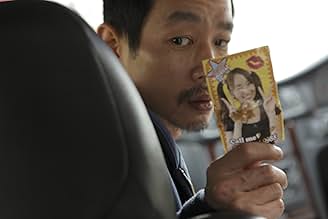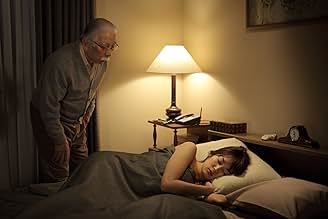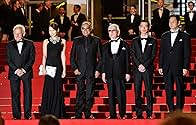VALUTAZIONE IMDb
7,0/10
13.561
LA TUA VALUTAZIONE
Aggiungi una trama nella tua linguaIn Tokyo, a young sex worker develops an unexpected connection with a widower over a period of two days.In Tokyo, a young sex worker develops an unexpected connection with a widower over a period of two days.In Tokyo, a young sex worker develops an unexpected connection with a widower over a period of two days.
- Regia
- Sceneggiatura
- Star
- Premi
- 1 vittoria e 6 candidature totali
Kôichi Ôhori
- Taxi Driver
- (as Kouichi Ohori)
Ryota Nakanishi
- Student
- (non citato nei titoli originali)
Recensioni in evidenza
This is a film that from the get-go grabs your interest. It has a unique story, a stylish look and some saddening, emotional moments from it's very beginning that really get you invested in it. A student with a working-class and jealous fiance jilts both him and her concerned family to work secretly as a call girl with her best friend Nagisa. An elderly widower who hires her to talk to him eventually befriends her and becomes more and more involved in her life.
There's so much potential here and as I said, it really hooks you from the get-go in every way. Unfortunately, I felt like I enjoyed parts of this film despite Abbas Kiarostami's direction, rather than because of it. The plot is intriguing (if a bit underdeveloped), the characters and their dynamics are really interesting and the acting is well done all-around. Pretty colours, interesting cinematography too. But jesus, the director really manages to test your patience and turn all of these elements from the genre of dramatic film into the one of tedium and high-level boredom.
I'm sure many would call me uncultured for this, but I really don't see what a five-minute shot of an old man sleeping in his car adds to anything, other than the running time. It's infuriating, because you start to care about the characters and the story and then gradually your thoughts turn to contemplating fast-forwarding or turning the whole damn thing off. Stupid, pointless scenes such as a man realising he's parked on the street so he has to turn his car all the way around. No cutting - of course not - because this director considers himself an 'artisté' and has to show you the entire motion of a guy parking, unparking and driving in a circle in order to park his car someplace else. But hey, maybe it's a metaphor. I'll be sure to call my old English Lit teacher and ask them for the deeper meaning. In the meantime, I was bored to death.
I was going to say that ultimately, the one thing this film did was show me that you can actually enjoy a film even when it frustrates you persistently throughout. But with the way it ends - abruptly, very rushed and without any kind of deep meaning or interesting takes or anything at all, and taking so long to get there - I couldn't even say that.
The most frustrating thing is that if you cut out all the unnecessary chaff, you could have filled the gaps in this film and made it a truly great movie. Develop the main characters a bit more, follow through their quarrels and moral conundrums, give us something to think about instead of pushing ideas into frame and then fading them back out undeveloped, never to be seen again. Unfortunately, this film is instead full of gratuitous scenes only the director himself and armchair cinephiles could really enjoy. A shame, and a real waste from what could have been.
I really wanted to like this one. But I couldn't.
There's so much potential here and as I said, it really hooks you from the get-go in every way. Unfortunately, I felt like I enjoyed parts of this film despite Abbas Kiarostami's direction, rather than because of it. The plot is intriguing (if a bit underdeveloped), the characters and their dynamics are really interesting and the acting is well done all-around. Pretty colours, interesting cinematography too. But jesus, the director really manages to test your patience and turn all of these elements from the genre of dramatic film into the one of tedium and high-level boredom.
I'm sure many would call me uncultured for this, but I really don't see what a five-minute shot of an old man sleeping in his car adds to anything, other than the running time. It's infuriating, because you start to care about the characters and the story and then gradually your thoughts turn to contemplating fast-forwarding or turning the whole damn thing off. Stupid, pointless scenes such as a man realising he's parked on the street so he has to turn his car all the way around. No cutting - of course not - because this director considers himself an 'artisté' and has to show you the entire motion of a guy parking, unparking and driving in a circle in order to park his car someplace else. But hey, maybe it's a metaphor. I'll be sure to call my old English Lit teacher and ask them for the deeper meaning. In the meantime, I was bored to death.
I was going to say that ultimately, the one thing this film did was show me that you can actually enjoy a film even when it frustrates you persistently throughout. But with the way it ends - abruptly, very rushed and without any kind of deep meaning or interesting takes or anything at all, and taking so long to get there - I couldn't even say that.
The most frustrating thing is that if you cut out all the unnecessary chaff, you could have filled the gaps in this film and made it a truly great movie. Develop the main characters a bit more, follow through their quarrels and moral conundrums, give us something to think about instead of pushing ideas into frame and then fading them back out undeveloped, never to be seen again. Unfortunately, this film is instead full of gratuitous scenes only the director himself and armchair cinephiles could really enjoy. A shame, and a real waste from what could have been.
I really wanted to like this one. But I couldn't.
Like Someone in Love (2012) is a Japanese movie written and directed by the great Iranian filmmaker Abbas Kiarostami. Kiarostami brings his quiet, thoughtful style to a culture that is surely very alien to him. Japanese viewers may note cultural errors in the movie. My thought is that Kiarostami can look beyond cultural differences to universal themes.
The movie, set in Tokyo, stars Rin Takanashi as Akiko, a young provincial woman who is a call girl. (She doesn't walk the streets. She works out of a bar, whose owner arranges the sessions at people's homes.) As the movie opens Akiko is facing two immediate problems. Her jealous boyfriend is on the phone, demanding to know where she is. Akiko is a college student, and her boyfriend is aware of that. He doesn't know that she's a prostitute, but he can sense that something isn't right, and he suspects her of cheating.
Akiko's grandmother is visiting Tokyo that day, and desperately wants to see Akiko. Akiko would love to meet with her, but the bar owner is adamant--she must go out on a call to an important client. The client is Professor Takashi Watanabe, played by Tadasi Okuno. Akiko has no choice but to ignore her grandmother and visit the professor's apartment.
Prof. Watanabe is a gentle, lonely widower. He has prepared a special dinner for Akiko, and he's playing Western music. (It's Ella Fitzgerald singing "Like Someone in Love.") It's more like a seduction scene than a paid sexual encounter.
Akiko spends the night at the professor's home, and he drives her to the university the next morning. It's at that point that the film takes a different turn, because Akiko's violent boyfriend confronts her on the university steps.
All of this action takes place in the first third of the movie. In the remainder of the film, Kiarostami continues to explore this unusual and somewhat threatening love triangle. This interaction among three very different individuals provides a fascinating look into human relationships. Where these relationships will lead isn't always obvious or predictable.
I enjoyed this intelligent, thought-provoking movie. It will work well on DVD. It's worth seeking out and watching.
The movie, set in Tokyo, stars Rin Takanashi as Akiko, a young provincial woman who is a call girl. (She doesn't walk the streets. She works out of a bar, whose owner arranges the sessions at people's homes.) As the movie opens Akiko is facing two immediate problems. Her jealous boyfriend is on the phone, demanding to know where she is. Akiko is a college student, and her boyfriend is aware of that. He doesn't know that she's a prostitute, but he can sense that something isn't right, and he suspects her of cheating.
Akiko's grandmother is visiting Tokyo that day, and desperately wants to see Akiko. Akiko would love to meet with her, but the bar owner is adamant--she must go out on a call to an important client. The client is Professor Takashi Watanabe, played by Tadasi Okuno. Akiko has no choice but to ignore her grandmother and visit the professor's apartment.
Prof. Watanabe is a gentle, lonely widower. He has prepared a special dinner for Akiko, and he's playing Western music. (It's Ella Fitzgerald singing "Like Someone in Love.") It's more like a seduction scene than a paid sexual encounter.
Akiko spends the night at the professor's home, and he drives her to the university the next morning. It's at that point that the film takes a different turn, because Akiko's violent boyfriend confronts her on the university steps.
All of this action takes place in the first third of the movie. In the remainder of the film, Kiarostami continues to explore this unusual and somewhat threatening love triangle. This interaction among three very different individuals provides a fascinating look into human relationships. Where these relationships will lead isn't always obvious or predictable.
I enjoyed this intelligent, thought-provoking movie. It will work well on DVD. It's worth seeking out and watching.
This is one of the very few good films I have watched in a while. This film is criticised for being simple, but Kiarostami's craft is almost flawless and very realistic. There are times when I questioned the duration of real-time in the film as he opt not to use jump cuts to show the shift in time, but except that minor glitch, this film was highly tense, deep and meaningful at so many levels.
Unlike the superficial Hollywood garbage we get to see everyday, Kiarostami's films show us real people with real problems. Probably one of the very few directors who can claim to have real class in this present era. I started watching this film after reading an interview with the director. The film did not disappoint me even a little bit. I am ashamed that I did not come across his name before.
Unlike the superficial Hollywood garbage we get to see everyday, Kiarostami's films show us real people with real problems. Probably one of the very few directors who can claim to have real class in this present era. I started watching this film after reading an interview with the director. The film did not disappoint me even a little bit. I am ashamed that I did not come across his name before.
"Like Someone in Love" is Abbas Kiarostami's follow-up to the mind- bending relationship drama "Certified Copy". Dissection of the title alone provides so many interesting clues and directions for the film to take in addition to what was analyzed previously. And while it does in fact address those interesting ideas (indirectly), it is as minimal as any film-going audience could possibly stand. We essentially watch an unexplained relationship unfold in almost real-time (just under 24 hours).
Akiko (Rin Takashi) is a college-aged girl up to something in the big city of Tokyo that is probably not good for her. She's having an argument with her boyfriend on the phone and she's saying no to a job that a middle-aged man is offering her. This middle-aged man is clearly her pimp and "no" means "yes, sir, I will do whatever you tell me to." So into the cab Akiko goes and we begin to worry about her safety. We spent an awful long time worrying about her safety with no idea what lies ahead for her. The cab ride was two hours long and we saw a lot of it. Akiko arrives at the apartment of an older gentleman looking for companionship. We don't really know what exactly Takashi Watanabe (Tadashi Okuno) wanted with Akiko, and then in the morning he drives her back to Tokyo. Another long car ride.
Visually the car rides were impeccably shot. The scenery was reflected in the windshield and we could still see the characters' faces behind. Unfortunately we don't really know what's happening with these characters during these long car rides. Sometimes a car ride is just a car ride.
Eventually we meet Noriaki (Ryo Kase), Akiko's offensive boyfriend. And he starts putting the relationships into perspective. A different perspective. He allows Akiko and Watanabe to act differently than they actually are, which allows us to start seeing them as they actually are. And then it ends. Well, not quite that quickly, but without giving anything away, it ends.
We're given so little on screen to examine that it can be frustrating even to the viewers that appreciate the subtle beauty in film. Two weeks after first seeing it, my mind has started to form a few opinions on what was being said but it's still a bit too little, too late.
Akiko (Rin Takashi) is a college-aged girl up to something in the big city of Tokyo that is probably not good for her. She's having an argument with her boyfriend on the phone and she's saying no to a job that a middle-aged man is offering her. This middle-aged man is clearly her pimp and "no" means "yes, sir, I will do whatever you tell me to." So into the cab Akiko goes and we begin to worry about her safety. We spent an awful long time worrying about her safety with no idea what lies ahead for her. The cab ride was two hours long and we saw a lot of it. Akiko arrives at the apartment of an older gentleman looking for companionship. We don't really know what exactly Takashi Watanabe (Tadashi Okuno) wanted with Akiko, and then in the morning he drives her back to Tokyo. Another long car ride.
Visually the car rides were impeccably shot. The scenery was reflected in the windshield and we could still see the characters' faces behind. Unfortunately we don't really know what's happening with these characters during these long car rides. Sometimes a car ride is just a car ride.
Eventually we meet Noriaki (Ryo Kase), Akiko's offensive boyfriend. And he starts putting the relationships into perspective. A different perspective. He allows Akiko and Watanabe to act differently than they actually are, which allows us to start seeing them as they actually are. And then it ends. Well, not quite that quickly, but without giving anything away, it ends.
We're given so little on screen to examine that it can be frustrating even to the viewers that appreciate the subtle beauty in film. Two weeks after first seeing it, my mind has started to form a few opinions on what was being said but it's still a bit too little, too late.
The great Iranian director Abbas Kiarostami made "Like Someone In Love" in Japan but it could have been set anywhere for this is a film that knows no boundaries or borders. As you would expect from Kiarostami it's brilliantly written and directed and beautifully played, particularly by Tadashi Okuno as an old professor whose loneliness draws him to a young student supplementing her income by working as an escort. He's not looking for sex, just conversation and company and when, the next day, they run into her jealous boyfriend the old man allows himself to be mistaken for her grandfather ... and then the boy finds out the truth.
It's a film of mostly small dramas and when violence finally erupts Kiarostami keeps it off screen. For the most part these people simply talk, about their problems, their relationships and life itself and Kiarostami films sequences in 'real time' and with a fixed camera just as he does in his Iranian films. I found it mesmerizing, at times funny, sometimes moving and in the end, really rather shocking. It makes for essential viewing.
It's a film of mostly small dramas and when violence finally erupts Kiarostami keeps it off screen. For the most part these people simply talk, about their problems, their relationships and life itself and Kiarostami films sequences in 'real time' and with a fixed camera just as he does in his Iranian films. I found it mesmerizing, at times funny, sometimes moving and in the end, really rather shocking. It makes for essential viewing.
Lo sapevi?
- QuizIn the late 1990s Abbas Kiarostami was driving late at night while on a visit to Tokyo and witnessed a young girl on the side of the street dressed as a bride. In the years following, while visiting Tokyo to promote other films, he realized that he was always looking for that same girl because she had left such an impression but that he would never likely notice her again in real life because she wouldn't be wearing the same dress. This experience became the basis for the film.
- ConnessioniFeatured in At the Movies: Cannes Film Festival 2012 (2012)
I più visti
Accedi per valutare e creare un elenco di titoli salvati per ottenere consigli personalizzati
- How long is Like Someone in Love?Powered by Alexa
Dettagli
- Data di uscita
- Paesi di origine
- Siti ufficiali
- Lingua
- Celebre anche come
- Like Someone in Love
- Luoghi delle riprese
- Shizuoka, Giappone(Shizuoka Station)
- Aziende produttrici
- Vedi altri crediti dell’azienda su IMDbPro
Botteghino
- Lordo Stati Uniti e Canada
- 239.056 USD
- Fine settimana di apertura Stati Uniti e Canada
- 21.813 USD
- 17 feb 2013
- Lordo in tutto il mondo
- 562.878 USD
- Tempo di esecuzione
- 1h 49min(109 min)
- Colore
- Mix di suoni
- Proporzioni
- 1.66 : 1
Contribuisci a questa pagina
Suggerisci una modifica o aggiungi i contenuti mancanti
















